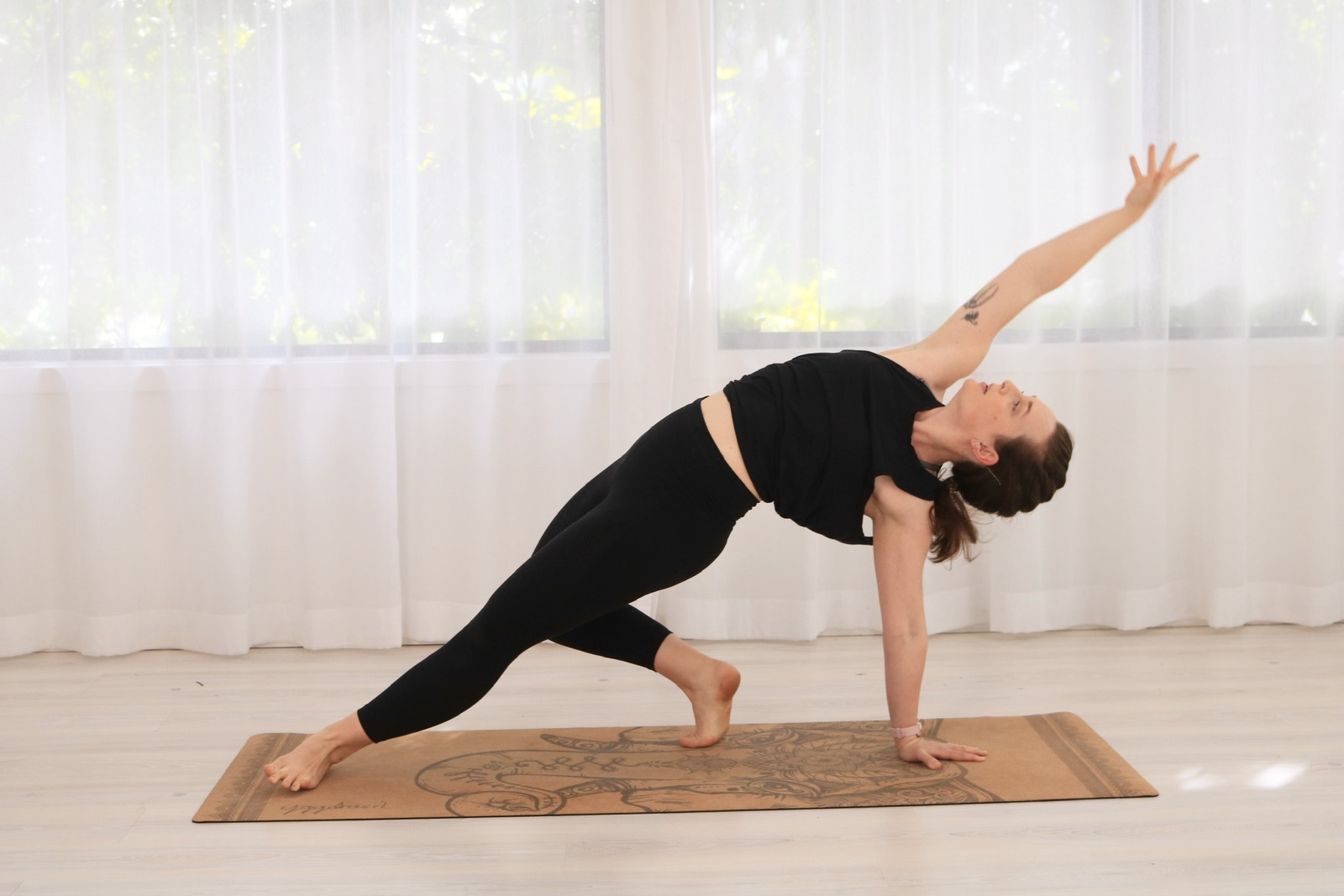July 1, 2024
By Emma English @thrivingnaturally_
Stress is a word that gets thrown around a lot these days, and it’s something that we all experience throughout our lives. It’s unavoidable but isn’t always a bad thing.
The physiological reflexes that respond to a stressful situation allow us to get through it safely. But when we spend too much time in a stressed state and can’t quite switch off that stress response, it becomes chronic stress. This can have multiple detrimental impacts not only on our mental and emotional health, but our physiological as well. Yoga has been practiced for thousands of years to maintain health of mind, body and spirit. Today, it is universally recommended that we practice yoga when we’re under stress. But why? As a yoga teacher and naturopath, I’ve outlined 5 ways yoga can combat stress.
We’re living in a world where we’re constantly bombarded with advertising, bright lights, deadlines, constant noise pollution, actual pollution, weird TikTok trends and endless screen-time. This means we’re constantly living in a state of moderate stress. Our yoga practice provides a sanctuary away from this. Maybe we’ve created a ritual and sacred space at home for it, or maybe we practice in a studio. To me, there’s nothing more comforting than walking into a yoga studio after a long stressful day where the lights are soft, the music is gentle and people are warm and smiling. I can literally feel the tension drain right out of me, and I’m not even on my mat yet! Spending an hour immersed in this calming environment essentially is giving the body and mind a break from the outside world and allowing it to disconnect to recharge, even if for only an hour.
The power of the mind and the flow on physiological benefits has long been studied. Positive thinking, affirmations and setting intentions are skills that take time to develop, just like other skill development or forming habits. In yoga, setting an intention or expressing your heart felt desire is called Sankalpa. By choosing a Sankalpa, focussing on it and repeating it, we’re reaffirming this thought pattern and essentially rewiring neural pathways for positive thinking. Focussing our minds on positive thoughts and intentions, trains us to believe these are true. ‘I am’ statements are simple ways to set a positive intention or Sankalpa. For example, ‘I am healthy’, ‘I am loved’, ‘I am strong’. By believing these positive thoughts and regularly practising these exercises, we can experience improved emotional and mental wellbeing. This helps us to respond to stressful situations more rationally and have the resilience to quickly bounce back afterwards.
Let’s just be clear, Vagus, sounds like ‘Vegas’ as in Las Vegas, but oh so unrelated! Moving along, the vagus nerve is our 10th cranial nerve and one of our parasympathetic nerves connecting our brain to the organs within our abdomen. Our parasympathetic nervous system is also known as our rest and digest system. The vagus nerve is responsible for many functions, such as digestion, heart rate, and respiratory rate, as well as vasomotor activity. As it is part of our parasympathetic nervous system, it provides the opposing actions to our sympathetic nervous system (AKA fight or flight).
When we’re faced with a stressful situation, we activate our fight or flight mode to fuel our bodies to get through it. After the event is over, we need to activate our rest and digest mode to shut off the fight or flight response otherwise we end up with depleted nutrients and can result in various deficiencies. When the vagus nerve is weakened (underactive nerves can be come weakened just like underactive muscles), it is less efficient in its function, which means it is more difficult to activate our rest and digest state. Doesn’t this sound stressful?
Luckily, there are ways to tone your vagus nerve, just like we tone our biceps, and yoga provides those ways!
Stress can impact us in many ways, and our digestion is just one of them. Back to our rest and digest state, we cannot digest effectively when we are in a heightened state of stress, so by participating in above-mentioned practices (breathwork & chanting) that stimulate our vagus nerve, we’re also assisting our gut. Another way in which we benefit our digestion is through our asanas or yoga poses. Twists are an awesome way to find spinal rotation, but I love them for giving my digestive organs some love! Think about your internal organs getting wrung out like a sponge in a twist. This is like giving them a massage, increasing circulation of blood and movement of lymph.
Inversions are another awesome way to give our digestive organs a new perspective. Literally. Think about it, most of the time, we’re vertical with our head above our feet. Sometimes we might lie on our sides or our bellies in bed, but we don’t often fully invert. Just like the benefits of a twist, we’re essentially allow the organs to experience a shift in gravity, this also helps to increase circulation. Remember, inversions are not just handstands. Getting upside down in an aerial hammock or using props in a supported bridge will have the same effects.
Endorphins are a type of neurotransmitter that act on pain sensors in our brain that promote feelings of pleasure and reduction in pain. They’re also associated with mood disorders. Low levels of endorphins have been correlated with anxiety and depression. Whereas on the flipside, high levels have an inverse effect. Physical activity releases endorphins. Increasing your heart rate in a hot yoga class, or feeling that lovely burn in a pose held for just that little bit longer, triggers the release of endorphins to help combat the temporary physically stress the body is under.
Remember – it’s called a yoga practice because it needs to be practiced consistently to achieve the ongoing benefits. Sometimes it can be hard sticking to that routine so please don’t feel guilty for missing out here and there. When you are in periods of extra stress in your life, it’s crucial to seek extra support. I’m all too familiar with how chronic stress impacts your physiological and psychological health. This is why I love to help people with it. I can’t take away the issue that has got you down. But as a naturopath, I offer tools, herbs and supplements that can create essentially a shield of armour to protect you as you make your way out to the other side.
If you, or someone you know is experiencing issues with stress, anxiety or sleep disturbances, please reach out to me. As Bend and Fly has always been a special place to me, I offer 15% off all first consults for any members or pass holders who use the code BENDFLY15

Emma English is a 350hr YTT and degree qualified naturopath. Emma is an eco-minded yogi who loves to work with people to help alleviate the impacts of stress and anxiety. Her favourite styles of yoga are slow flow and yin because of their beneficial effects of nourishing the nervous system. Emma offers online naturopathy consultations where she works with you to achieve your health goals. She has been an active member of the Bend and Fly community since day 1 and is eager to support this community with a special offer.
Find out more about Emma and Thriving Naturally through her website here or find her on Instagram @thrivingnaturally_

Grab our 2 Week Introductory offer for 14 days of unlimited studio access for only $55!
Have a look at all the incredible yoga and aerial yoga classes that you can try! Peruse our timetable below:
If you’d prefer to practice from the comfort of your own home, you can still join us! We have live streamed and on demand classes available as well as online only membership options through Bend + Fly TV. Find out more through the link below:
